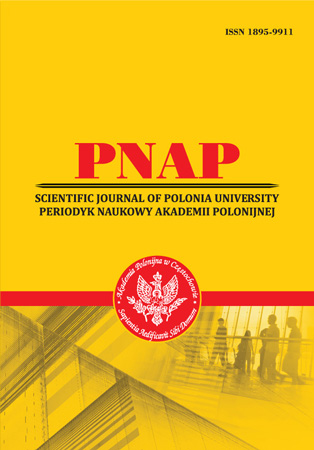THE METHODOLOGY FORMING OF ECOLOGICAL COMPETENCY OF FUTURE TEACHERS OF NATURAL SCIENCES DURING VOCATIONAL TRAINING
Abstract
The aim of this paper is to substantiate the effective combination of methodological approaches in the organization of the educational process of professional training of future teachers of natural sciences in the context of the formation of their ecological competency. It is proved that the combination of several methodological approaches (competence, system, personality- oriented, activity, technological, contextual, reflective and coevolutionary-noosphere) on the principle of synergetic interaction will ensure the effectiveness of their combined pedagogical influence in training and is a methodological basis for determining the content, forms, tools and technologies forming of ecological competency of future teachers. It is established that the main role among the mentioned methodological approaches to the organization of the educational process of professional training of future teachers of natural sciences is given to the competence approach. The introduction of a competency-based approach to the practice of higher pedagogical education makes it possible to achieve a number of educational goals. Methodological bases (ontological, epistemological, axiological, praxeological), as well as general and partial pedagogical regularities of competence-oriented education in the process of professional training are determined. They are ensure the effectiveness of the formation of ecological competency of future teachers of natural sciences.
References
2. Bekh, I. D. (1998). Osobystisno zoriientovane vykhovannia [Personally oriented education]. Kyiv: IZMN [in Ukrainian].
3. Bespalko, V. P. (1989). Slagaemye pedagogicheskoj tehnologii [Components of pedagogical technology]. Moskva: Pedagogika [in Russian].
4. Blauberg, I. V., Yudin, E. G. (1973). Stanovlenie i sushnost sistemnogo podhoda [Formation and essence of the system approach]. Moskva: Nauka [in Russian].
5. Burhun, I. V. (2010). Aktualnist uprovadzhennia kompetentnisnoho pidkhodu v ukrainskii osviti [The urgency of introducing a competency-based approach in Ukrainian education]. Aktualni problemy derzhavnoho upravlinnia, pedahohiky ta psykholohii. Zbirnyk naukovykh prats Khersonskoho natsionalnoho tekhnichnoho universytetu, issue 2, 159–165 [in Ukrainian].
6. Common European Principles for Teacher Competences and Qualifications. European Commission. Dubaseniuk, O. A., Vozniuk, O. V. (2011). Kontseptualni pidkhody do profesiino-pedahohichnoi pidhotovky suchasnoho pedahoha [Conceptual approaches to professional and pedagogical training of a modern teacher]. Profesiina pedahohichna osvita: kompetentnisnyi pidkhid. O. A. Dubaseniuk. (Ed.). Zhytomyr, 11–18 [in Ukrainian].
7. Education and Training 2010 Programme. (2008). Joint seminar Report. Cluster “Key Competences – Curriculum Development”.
8. Fokshek, A. V. (2011). Systemnyi ta synerhetychnyi pidkhody u modeliuvanni suchasnoho pedahohichnoho protsesu [System and synergetic approaches in modeling the modern pedagogical process]. Naukovyi visnyk Melitopolskoho derzhavnoho pedahohichnoho universytetu imeni Bohdana Khmelnytskoho. Seriia: Pedahohika, 6, 213–220 [in Ukrainian].
9. Honcharenko, S. U. (2008). Pedahohichni doslidzhennia: metodolohichni porady molodym naukovtsiam [Pedagogical research: methodological advice for young scientists]. Kyiv; Vinnytsia: DOV “Vinnytsia” [in Ukrainian].
10. Honcharenko, S. (1997). Ukrainskyi pedahohichnyi slovnyk [Ukrainian pedagogical dictionary]. Kyiv: Lybid [in Ukrainian].
11. Hutorskoj, A. V. (2007). Sovremennaya didaktika [Modern didactics]. Moskva: Vysshaya shkola.
12. Kremen, V. (2013). Pedahohichna synerhetyka: poniatiino-katehorialnyi syntez [Pedagogical synergetics: conceptual and categorical synthesis]. Teoriia i praktyka upravlinnia sotsialnymy systemamy, 3, 3–19 [in Ukrainian].
13. Lisova, S. V. (2011). Kompetentnisnyi pidkhid u vyshchii osviti: zarubizhnyi dosvid [Competence approach in higher education: foreign experience]. Profesiina pedahohichna osvita: kompetentnisnyi pidkhid. O. A. Dubaseniuk. (Ed.). Zhytomyr, 34–53 [in Ukrainian].
14. Pedahohichnyi slovnyk [Рedagogical dictionary]. M.D. Yarmachenko (Ed.). (2001). Kyiv: Pedahohichna dumka [in Ukrainian].
15. Piekhota, O. M., Kiktenko, A. Z., Liubarska, O. M. et al. (2001). Osvitni tekhnolohii [Educational technologies]. Kyiv: A.S.K. [in Ukrainian].
16. Rybalko, L. (2014). Navchannia pryrodnychykh predmetiv na zasadakh ekoloho-evoliutsiinoho pidkhodu v zahalnoosvitnikh navchalnykh zakladakh: teoriia i praktyka [Teaching natural subjects on the basis of ecological-evolutionary approach in secondary schools: theory and practice]. Poltava: FOP Myron I.A. [in Ukrainian].
17. Selevko, G. K. (2006). Enciklopediya obrazovatelnyh tehnologij [Encyclopedia of educational technologies]. (Vols. 1–2; Vol. 1). Moskva: NII shkolnyh tehnologij [in Russian].
18. Sharko, V. D. (2006). Teoretychni zasady metodychnoi pidhotovky vchytelia fizyky v umovakh neperervnoi osvity [Theoretical bases of methodical preparation of the teacher of physics in the conditions of continuous education]: Doctor’s thesis. Kyiv [in Ukrainian].
19. Siaska, I. (2018). Do problemy vprovadzhennia kompetentnisnoho pidkhodu u protses fakhovoi pidhotovky maibutnikh uchyteliv pryrodnychykh dystsyplin [To the problem of introduction of the competence approach in the process of professional training of future teachers of natural sciences]. Pedahohichni nauky: teoriia, istoriia, innovatsiini tekhnolohii, 10 (84), 179–189 [in Ukrainian].
20. Verbickij, A. A. (2004). Kompetentnostnyj podhod i teoriya kontekstnogo obucheniya [Competence approach and contextual learning theory]. Moskva: IC PKPS [in Russian].
21. Zhuk, O. L. (2008). Belarus: kompetentnostnyj pohod v pedagogicheskoj podgotovke studentov universiteta [Belarus: Competence-Based Approach in Pedagogical Training of University Students]. Pedagogika, 3, 99–105 [in Belarusian].
Abstract views: 371 PDF Downloads: 156







